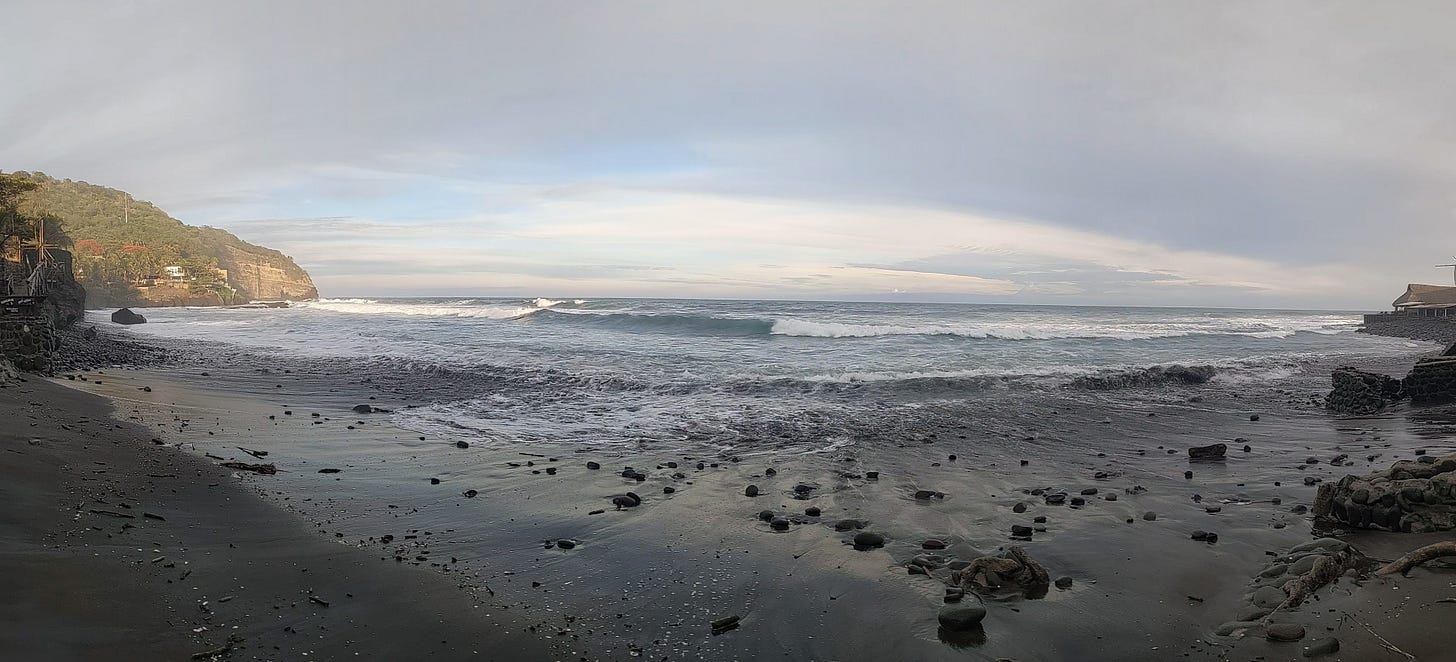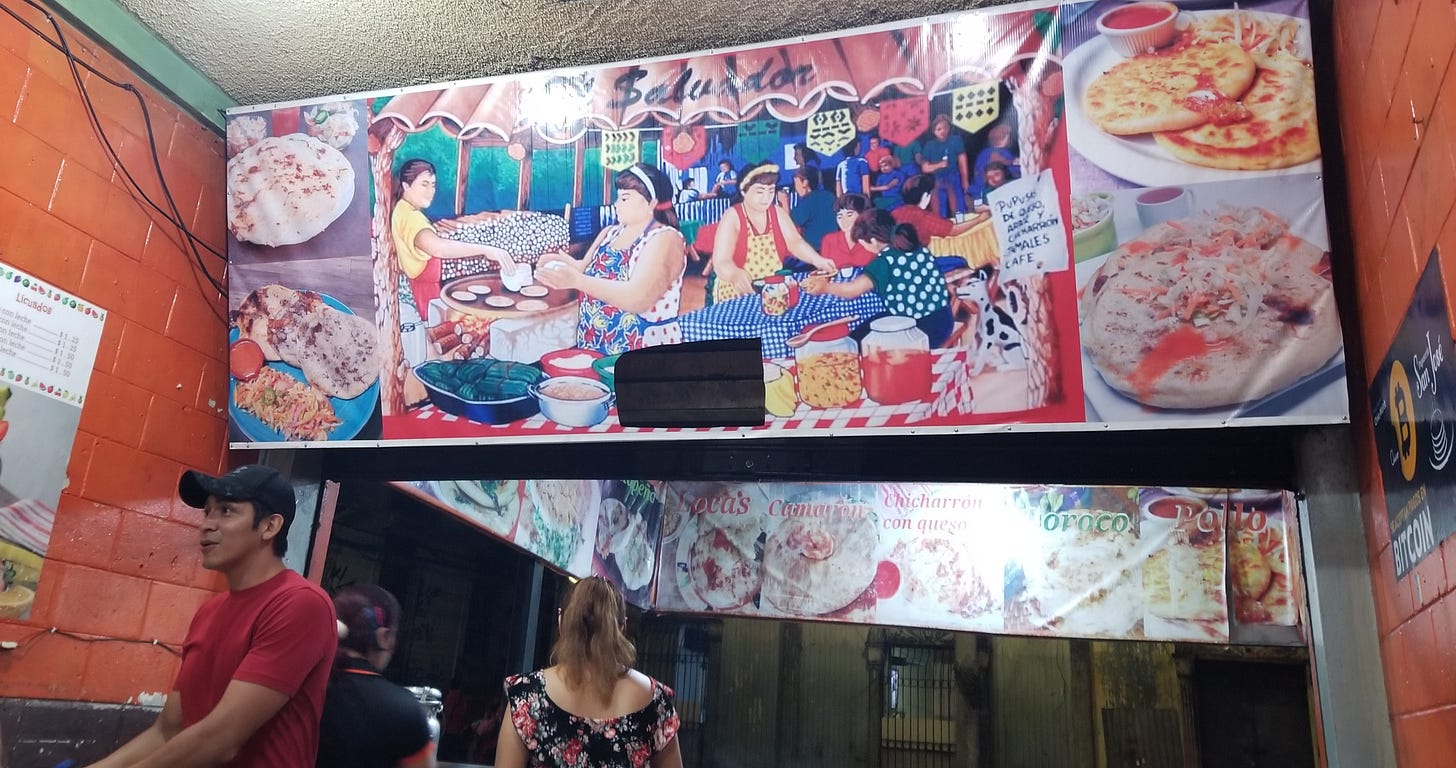More than two years after El Salvador burst onto the international stage by making Bitcoin legal tender, I was finally able to pay a visit to this almost mythic land, and it did not disappoint. From San Salvador to Santa Ana to El Zonte, everywhere you could see the national project changing the physical landscape, and sense the palpable excitement and connection of the people to the vibrant pulse of a nation truly reborn. ‘Don’t trust, verify,’ we bitcoiners like to say. To my very own surprise, the facts on the ground not only lived up to the hype, they exceeded it.
1. Pupusas and Pilsener
Traveling on a tight schedule, our only night in San Salvador seemed like a lost cause due to the 6-hour delay of our flight from Honduras. With the sun getting quite low on the horizon by the time we landed, our expectations to behold the cathedral and public square of the Centro Histórico in their full glory were mostly dashed. Thankfully, we went anyways.
After strolling around late into the night, and working up quite the appetite, Google Maps indicated that “San Jose” was the only pupuseria still open nearby. The place was very unassuming, a ‘hole in the wall’ type of establishment. Workers finishing their long day shifted in and out, getting a quick bite before going home for the night.
Inside, neon lights bounced off the bright orange cement walls, and in the front, next to the grill where a young woman churned out pupusas by the dozen, a big purple Chivo sign read “Se aceptan pagos con Bitcoin.” I am not one to believe in omens, but when the universe gifts you purple and orange at the people’s pupuseria of choice, the classy thing to do is to acknowledge, and enjoy.
After getting our order, we made our way to the long wooden benches that lined the walls on each side, and sat among the jars of pickled cabbage decorating the rows of cheap plastic tables. As we wolfed down the pupusas and drank our Pilsener beers, a voice beamed down from the TV hanging by the ceiling menu: “He arrived at the presidency in debt, with his investments in the gutter, and this person left the presidency as a millionaire...”
It was Attorney General Rodolfo Antonio Delgado Montes, talking to the press after confiscating the properties of Alfredo Cristiani, former president and surrogate for Monsanto in Central America. Far from being another sanitized news segment, the AG spoke candidly and at length, seemingly without a script, while everyone in the pupuseria listened intently; even the workers turned to watch or glanced at it as they multi tasked. ‘For once, justice is served,’ the atmosphere whispered atop the sizzling of the grill.
Soon, with a full belly and some alcohol in our blood, the moment of truth approached. Would they truly accept Bitcoin? Sure enough, Juan flashed a big grin when I asked, whipped out his Chivo wallet, and produced a QR code for me to scan. To my surprise, it was an on-chain nested Segwit address that began with a 3. Not discouraged, I asked for a lightning invoice, which confused Juan. It turns out, nobody had explained to him the difference, and he did not know if Chivo even had Lightning. A few taps later, however, it all worked out and I zapped him $6.05 from my Phoenix wallet.
2. Like asking for a doggie bag at a Michelin restaurant
Even though bitcoiners love to refer to Satoshi’s beloved invention as ‘the people’s money,’ the reality is that in most of the industrialized nations, Bitcoin has gained more footing as an investment vehicle than as something that captures the hopes and dreams of the poor and the financially marginalized. And though we are working hard to change that, and change it shall in due time, at the moment Bitcoin is mostly associated with the financial markets, tech investment proposals, venture funds and the sort.
For example, while Jack Mallers is constantly asked to speak on Bloomberg news, indicating the business community is developing a nuanced and sophisticated understanding of the issue, popular lefty outlets like DemocracyNow continue to stick to skewed and misinformed establishment narratives about Bitcoin. Nor is the media coverage the only sign of Bitcoin’s lack of purchase among the most disadvantaged. Each year, to join the biggest celebration and gathering of bitcoiners, the cheapest tickets will set you back hundreds of dollars, not including the cost of lodging and transportation. This is not a value judgment, just the reality on the ground.
In El Salvador, the equation seemed to be reversed.
Our experience in the pupuseria replicated itself dozens of times during our stay in the country. From taxi drivers to stand vendors, we were able to successfully pay with Lightning quite consistently, about half of the time. But most curiously, adoption had the least penetration the more affluent the environment became.
Take the example of our accommodations: we stayed at Hotel Armonia in San Salvador, and Captain Morgan Hostel by Lake Coatepeque. Both charged around $60 per night, and both accepted Lightning. In fact, I had some great banter about Bitcoin adoption with the staff at Hotel Armonia, and left a chalk note for posterity with the price of Bitcoin at Captain Morgan.
However, Hotel Equinoccio, by far the most expensive place in our list at $150 per night, did not take Bitcoin payments. From a pool by the volcano lake, to private jet skies, to a perfectly manicured lawn to sunbathe in and a menu with exotic ‘detox’ drinks, this place had it all. Except Bitcoin payments. In fact, when I asked Fernando, he gave me a strained, hard to decipher look. It was not confusion, for he most decidedly knew what Bitcoin was, but a mix of consternation and surprise at my request, as if I was asking for a doggie bag at a Michelin restaurant.
Later on, when I approached him with my empty water bottle and asked him where the water dispenser was, the same look appeared on his face ever so briefly: “we have bottled water from the menu,” he quipped politely, as if I had just asked something ridiculous. It dawned on me, then, that Bitcoin was perhaps seen in bad taste, and just like my request for ‘free’ water, it was deemed a “poor people thing” beneath the stature of the sanitized, gated environment where the rich in El Salvador go to relax.
3. More Than Just Bitcoin
In the time I spent traveling El Salvador, it became clear that the country’s transformation goes far beyond Bitcoin, even though Bitcoin is an integral part of that transformation. From the National Library in Centro Histórico, to the hotel boom in El Zonte, everywhere I went there were life altering construction and infrastructure projects.
Among what impressed me the most, was how smooth and extensive the road infrastructure was. By the surging waves of the Pacific, where the serpentine curvature of the mountains and hills forced the road to tunnel through rock formations, I was awed by beauty and engineering feats that reminded me of Taiwan, a country whose infrastructure has long been considered among the best in the world.
Change, however, takes time, and El Salvador still has a lot of catching up to do. The same could be said for the country’s Bitcoin adoption. Most people, even the lady at the customs booth charging the $15 entry fee, still have no clue about the difference between Lightning and on-chain. And the places that do accept Bitcoin, seem to receive very little use from locals.
As education efforts ramp up and a new generation of youth grow up with Bitcoin as an ubiquitous tool in their lives, things will improve. But meanwhile, El Salvador continues to be, indisputably, The Bitcoin Country, not simply because the law recognizes it as legal tender, but rather because here it is seen by the wealthy as a “poor people thing.” I can think of no better vindication for a currency that bids itself to be, and is built upon the aspiration to become the people’s money the world over.
¡Hasta la próxima El Salvador!
Note: People’s names have been changed.







